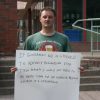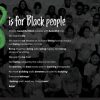
KJIPUKTUK (Halifax) – “If you’ve met one person with autism, then you’ve met one person with autism.”
Yes. That is true.
But it’s also a phrase coined by autistic people that has frequently been used against us by allistic (non-autistic) parents. That happens a lot. Let me explain.
How it got co-opted
The phrase was originally coined by autistic professor Stephen Shore to emphasize the fact that autistic people should not be lumped into one category, as so often happens. And it’s true…..no two autistic people are the same. We all have our own personalities, strengths, weaknesses and abilities, just like every other human being on Earth!
Autistic people have said this to parents and professionals who try to shoehorn us into various therapeutic or educational boxes, which of course doesn’t work, because we’re all different.
Unfortunately, like many things autistic people say to assert themselves, the expression eventually got co-opted by the very people we were trying to educate.
Very often allistic parents talk about things like their autistic children engaging in “aggressive” behaviour, or the fact that they may not be toilet-trained yet, or, most commonly, that they are “non-verbal” and therefore unable to communicate. (Many autistic people prefer the term “non-speaking” but for the purposes of this article, that’s neither here nor there.)
When allistic parents do this, autistic people, if they feel up for it, will sometimes try to tell the parents why these things are happening. Very often, the parents will ignore and dismiss this advice with comments to the effect of “You aren’t like my child!” or “You don’t speak for my child! I am his/her voice!” or even “You must be high-functioning if you can have this conversation!”
And they also may pull the “if you’ve met one autistic….” line to try to further prove their point that the autistic person trying to explain something doesn’t know what they’re talking about.
But the truth is, autistic people are the real experts on autism. They have the lived experience of being autistic that the allistic parents simply don’t have. They have so much more in common with autistic children than their non-autistic parents ever will. And no amount of talking to other “autism parents” will ever change that.
Autistic people – children and adults – have a lot of shared experiences and history. But allistic parents and professionals have a real tendency to think that actually autistic people should only talk about their own personal, individual experiences, and never about bigger issues that affect the wider autistic community.
Which brings me to another word that can sometimes be turned against us:
Self-advocate.
Why some autistics don’t like the term “self-advocate”
The term “self-advocate” was first coined by people with intellectual disabilities, many of whom were survivors of institutionalization. The self-advocacy movement began in Sweden in the 1960s, when people with intellectual disabilities were encouraged to form and lead their own leisure clubs. In 1968 and 1970, national conferences for the clubs’ members were held, where they prepared statements about how they wanted to be treated.
In 1972, the idea spread to the United Kingdom, Canada and the United States, and people labeled with intellectual disabilities formed self-advocacy groups in response to the control that proponents of institutionalization imposed upon them. In Oregon, a group called “People First” was formed, because they felt their disabilities were secondary to them being a person above all else.
From there, the term spread to the autistic community and the broader disability communities. However, this term has also become weaponized against us in the last several years.
Non-autistic people, especially parents, have used this term as an excuse to demean and dismiss the work of autistic activists. It implies that we must only advocate for ourselves and nobody else. By this, I mean if someone calls me a “self-advocate”, it sounds as if I should only be advocating for my own personal needs and not those of my fellow autistics. To be clear, this is not what movements such as People First are propagating.
Of course it’s true that we cannot speak for all autistics. But when people try to minimize and silence us in this way, they are trying to stop us from standing up for the wider autistic community.
The thing is, autistic activists stand up and fight for each other all the time. This is true for practically all marginalized groups throughout history. Very often, we do this at great personal risk. In fact, people have nearly died for this thing that we do.
As mentioned above, autistic people have a great deal of shared experiences and history. But this is constantly being erased by allistic parents and professionals, the mainstream media, politicians, and the mainstream autism organizations.
For this reason, there are a lot of autistic folks who don’t really care for the term “self-advocate.” And it’s extremely important to understand how the term has been co-opted by people who hold more power than autistic activists do.
At the same time, there are those who do call themselves “self-advocates.” And that’s okay….as discussed, the term has a very important and powerful history.
Remember: When autistic people demand change, it is never for ourselves and ourselves alone. It is for all our fellow autistic and disabled people, today, and all autistic and disabled people after us.
With a special thanks to our generous donors who make publication of the Nova Scotia Advocate possible.
Subscribe to the Nova Scotia Advocate weekly digest and never miss an article again. It’s free!



